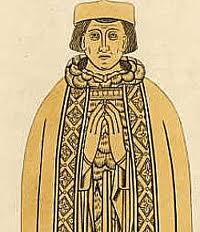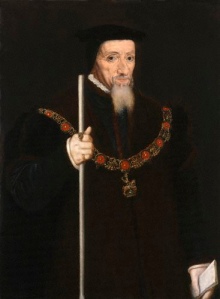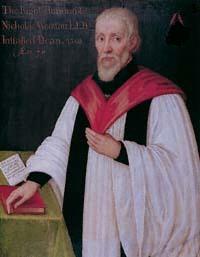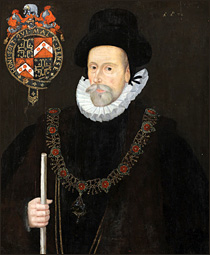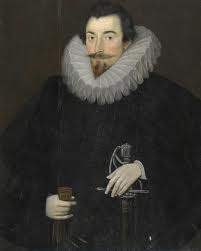Reigned with Your Loves
Connections and service, be they within personal or formal relationships, create loyalty. Loyalty which can be demonstrated in many ways. Both Henry VII and Elizabeth Regina developed heightened abilities in sensing gifted allies to serve them. Perhaps the skills were honed during their times of confinement (Henry in Brittany and Elizabeth at Hatfield) or they were innate. Regardless, each surrounded themselves with talented, loyal councilors.
Henry knew that if England was to recover and the throne was to become stable, the War of the Roses would have to end and healing would have to take place. What was required now was for the king to be resolute and to act with “judicious mercy, the mercy of head not heart.” Henry VII was to display clemency and firmness by his “reluctance to proceed to extremes and his readiness to accept old enemies into the fold.” Actions which “display his determination to show that the wars were over” (Elton 16).
Henry not only utilized Lancastrian loyalists, gentry from his native Wales, and fellow exiles, he also incorporated the Yorkist faction in his new government. He knew he must not further antagonize the opposition. Therefore, he pardoned men who had fought at Bosworth against him, and allowed them to enter government positions, even granting them property, if they took the oath of allegiance. He approached the many Woodville Yorkists cautiously as he did not want to be indebted to them nor to give the impression he reigned in any name but his own– meaning he did not want to appear to have need of Elizabeth of York’s family ties to strengthen his claim. “As a new man, Henry had to secure his place. He did this by a compromsing approach” (Bacon and Weinberger 238).
Henry had little knowledge of England and its government workings as he had been in exile for so many of his formative years. He was even unprepared for the responsibilities and life of a king. He thus relied heavily on the associates of his youth and those men who had joined him in exile along with many advisors from his mother’s household.
Margaret Beaufort
Henry and his mother, Margaret Beaufort, recognized the need for experienced men to provide council. Therefore, her household became a basis for Henry to draw officials from such as Christopher Urswick and Reginald Bray. Many of his contemporaries recognized that service his mother could easily lead to a royal appointment. Henry viewed service to his mother almost as those who served him “during his period of exile, as a debt of honour” (Jones 80).
Needing men of experience also meant he had to appoint those who had been in England and not exiled—people familiar with the ways of England. Therefore, a mix of noblemen, gentry, lawyers and clerics were used to comprise Henry VII’s Council (Loades 30). Henry did not want to give too much power to the men with governmental experience. He kept the nobles contained and “chose rather to advance clergymen and lawyers, which were more obsequious to him…” (Bacon and Lumby 217). These men recognized for their talents were more grateful to the king.
Henry was adamant about allegiance and service. The men he appointed were “loyal and ardent servants of an exacting but worthy master” (Elton 17). Despite his harshness, “Henry showed himself capable of attracting men to his side and retaining their loyalty…” (Griffiths 168).
Henry VII, seated in the Star Chamber
“Like all his family he had an uncanny gift for picking men to serve him, and not even the great Elizabeth surrounded herself with a brighter galaxy of first-rate ministers than did her grandfather” (Elton 17). It is not the purpose here to list every member of Henry’s Privy Council, the focus will be on those he relied upon early in his reign. Below, in chart form, are listed the pertinent advisors and servants.
Councilors Serving Henry VII
|
Councilor / Servant |
Role |
Miscellaneous |
| Jasper Tudor, Duke of Bedford | Military advisor and commander | paternal uncle to Henry, took him into exile |
| John de Vere, 13th Earl of Oxford | Military advisor and commander | shared exile and influntial as nobleman |
| Sir Giles Daubeney | Chancellor | shared exile and very influential |
| Cardinal John Morton—Archbishop of Canterbury | Lord Chancellor | financial advisor/innovator dare we say exploiter |
| Bishop Richard Fox | Lord Privy Seal | shared exile, very influencial after Morton’s death |
| Bishop Peter Courtenay | Keeper of the Privy Seal | shared exile |
| Bishop William Warham | Master of the Rolls and later Lord Chancellor | performed many diplomatic missions |
| Sir Reginald Bray | Courtier | acquired from Margaret Beaufort’s advisors,very influential and architect of Henry VII’s Chapel at Westminster Abbey and St. George’s Chapel, Windsor |
| Christopher Urswick | Courtier | acquired from Margaret Beaufort’s advisors |
| Sir John Heron | Treasurer of the Chamber | shared exile and one of the most trusted advisors |
| Sir Edward Belknap | Surveyor of the King’s Prerogative | could confiscate anyone’s land that overtook the King’s prerogative |
| Richard Empson | Carried out Cardinal Morton’s financial policies | arrested under Henry VIII for unpopular financial activities |
| Edmund Dudley | Carried out Cardinal Morton’s financial policies | executed under Henry VII for unpopular financial activitiesGrandfather to Robert Dudley, Earl of Leicester |
| Sir Thomas Lovell | Treasurer of the Chamber | shared exile and one of the most trusted advisors |
| Sir Richard Guildford | Chamberlain of the Receipt | shared exile and one of the most trusted advisors |
| Thomas Rotherham, Archbishop of York | Lord Chancellor | experience in previous reigns, did not serve Henry very long |
| John Alcock, Bishop of Worcester | Lord Chancellor | experience in previous reigns, bridge between Edward IV, Richard III and Henry’s rule |
| Sir Thomas Stanley, 1st Earl of Derby | High Constable of England | Henry’s step-father |
| Sir Edward Woodville | Courtier | brother to the Queen Dowager, military leader |
| Sir William Stanley, | Lord Chamberlain | brother to Henry’s step-father, executed for treason over Perkin Warbeck |
Jasper Tudor Giles Daubeney
John Morton Richard Fox
Peter Couetenay William Warham
Christopher Urswick Thomas Lovell 

Thomas Rotherham John Alcock
Thomas Stanley
“Henry became practiced in awarding empty honours and rewards to the deserving, which gratified the receivers and heightened their loyalty to him without increasing their actual strength” (Ross 19). Minor merchants or officials who had helped him in one way or another were rewarded as well—prudently. Henry was not a man to throw money around and, although he was generous, it was not beyond his means or beyond what was suitable. e rewarded people who had served his father and other Welsh followers, had helped his mother and even those who had served his revered uncle, Henry VI. (Griffiths 175).
Machiavelli wrote that a prince should be feared over loved although it would be ideal to be able to be both. In Henry VII’s case it appears as if he did not manage fear and love. Down the ages we have Edmund Dudley’s treatise, Tree of the Common Wealth, written in defense of absolute monarchy as applied to Henry VI. Dudley defended Henry’s actions (and maybe reflecting Henry’s views) by stating that if the King was lenient to his subjects “in all cases let them … psume to take it of theire owne authoritie, for then it will surelie choke them” (Dudley 28).
Henry did set the path for his administration although Bacon proclaimed that Cardinal Morton and Sir Reginald Bray not only reflected Henry’s views but “did temper them” (Bacon 214). Whereas Empson and Dudley, middle-ranking servants who rose to prominence by being men who “best content the king” (Penn 33), did not moderate his policies, especially financial, “but shaped his way to those extremities, for which himself was touched with remorse at his death….” (Bacon 214).
It is well-known that many of Henry’s financial practices were disliked by his people. Bacon proclaimed that ” of the three affections which naturally tie the hearts of the subjects to their sovereigns, love, fear, and reverence; he had the last in height, the second in good measure, and so little of the first, as he was beholden to the other two” (Bacon and Lumby 218). Financial acts were not popular with anyone but the benefits of his stable rule, his courts of law and justice did benefit everyone and they knew it too.
Henry VII, Richard Empson and Edmund Dudley
By implying to the people that civil war would happen if they lost him, Henry maintained stability. Another method he consciously employed to control his ministers was in the journal he kept of his thoughts. It included notes he wrote while in conversation with ministers, diplomats and advisors about whom to reward and whom to watch—this was similar to his granddaughter. Elizabeth Regina kept mental notes of conversations and events she engaged in with her ministers to utilize if necessary in future dealings.
Elizabeth “kept her advisers off balance and perpetually astonished them by the range and mutability of her passions. Beyond this, they came to know that, with Elizabeth, nothing was ever what it seemed. Beneath her surface emotions were layer upon calculating layer of secondary reactions, ploys and schemes” (Erickson 173). She enjoyed laying traps for her ministers, throwing back at them their own words. Yet, they were devoted to her, perhaps because of her political, intellectual and interpersonal skills. An example could be from the way she handled the ex-ministers of Mary’s reign. Elizabeth greatly reduced the number of advisors and assured those that had served Mary that they were not retained because she wanted a smaller group to make it more manageable and less open to faction, not because of any deficit on their part (Neale 55).
Battles for Court positions were based on “loosely structured groups focusing on family, household, and master-servant connections…” (Warnicke 135). Some men were ambitious seeking power and money, others were honored to serve. Or, as Mervyn James has shown, “the ties of blood were liable to assert themselves with a particular power” (James 325).
As Queen, Elizabeth did not forget those who were still alive and had served her mother, Anne Boleyn. William Barlow was created Bishop of Chichester; William Latymer, became Dean of Peterborough under Elizabeth and author of Chronickle of Anne Bulleyne; and Matthew Parker appointed Archbishop of Canterbury. Parker had been chaplain to Anne Boleyn. Although he did not want to take the Archbishopric, he did so based on a promise he had made to Anne shortly before her death to watch out for the spiritual needs of her daughter.
Like her grandfather, Elizabeth kept her beloved servants of her childhood and youth. She knew the Privy Council, the body that held up the authority of the Crown and was key to forming royal policy, should be conciliatory to the previous reign and diverse. In respect to the first consideration, Elizabeth retained 10 ministers from Mary’s reign. Taking a page from her grandfather, she kept members of the opposing faction in her council. Whereas his were Lancaster and York, hers were Catholic (Marian) and Protestant (Elizabethan).
For diversity, as did Henry, she promoted gifted men of the professions, many who had never held high office before, while keeping a balance of nobles and clergy. Her main criteria appeared to be efficiency, talent and loyalty. She wanted advisors who would give good counsel and ones she could trust.
It is not the purpose here to list every member of Elizabeth’s Privy Council, the focus will be on those she relied upon early in her reign. Below, in chart form, are listed the pertinent advisors and servants.
Councilors Serving Elizabeth Regina
|
Councilor / Servant |
Role |
Miscellaneous |
| Edward Stanley, 3rd Earl of Derby | High Chamberlain | served Mary, kept due to prominent role in nobility |
| Francis Talbot, 5th Earl of Shrewbury | Courtier and Privy Council Member | served Mary, kept due to prominent role in nobility—died within 2 years, son George famously married Bess of Hardwick and was custodian of Mary, Queen of Scots as 6th Earl |
| Henry FitzAlan, 19th Earl of Arundel | High Constable and Lord Steward | served Mary, kept due to prominent role in nobility as relative to Woodvilles and Percys. |
| Henry Herbert, 2nd Earl of Pembroke | Lord Lieutenant | served Mary, kept due to prominent role in nobility as husband to Lady Katherine Grey |
| William Howard, 1st Baron Howard of Effingham | Lord Admiral and Lord Chamberlain | served Mary, Elizabeth’s great-uncle and defender in Marian court |
| William Paulet, Marquis of Winchester | Treasurer and Speaker of the House | served Mary, great administrator |
| Edward Clinton, later Earl of Lincoln | Lord Admiral andAmbassador to France | served Mary, he was Lord Admiral and capable |
| Sir John Mason | Diplomat and Chancellor of Oxford University | served Mary, was knighted as public servant |
| Sir William Petre | Secretary of State | served Mary, lawyer & tutor to George Boleyn rose rapidly and was knighted |
| Sir Nicholas Wotton | Diplomat | served Mary, commoner and cleric |
| Sir Thomas Parry | Comptroller of the Household | Elizabeth’s steward since childhood, relative to Cecil, in household at Hatfield and later knighted |
| Sir Richard Sackville | Chancellor of the Exchequer | Elizabeth’s relative as his mother was cousin to Anne Boleyn, had experience during Edward’s time |
| Sir Francis Knollys | Vice-Chamberlain of the Royal Household | Elizabeth’s relative as he married her cousin the daughter of Mary Boleyn, served Edward and a staunch Protestant |
| Sir Nicholas Bacon | Lord Keeper of the Great Seal | an attorney—very capable and had been in Edward’s Court, father to Francis |
| William Cecil, 1st Baron Burghley | Secretary of State later Lord High Treasurer | served Elizabeth during Mary’s reign while maintaining a position at CourtBacon’s brother-in-law |
| Francis Russell, 2nd Earl of Bedford | Diplomat | created into Peerage, staunch Protestant and collector—Armada Portrait at Woburn Abbey—godfather to Francis Drake |
| William Parr,1st Marquis of Northampton | Courtier | created into Peerage, brother to Katherine Parr |
| Sir Edward Rogers | Comptroller | served Edward and was in Elizabeth’s household at Hatfield |
| Sir Ambrose Cave | connection of Cecil’s, and was in Elizabeth’s household at Hatfield | |
| Robert Dudley, Earl of Leicester | Master of the Horse later Privy Council Member | known to Elizabeth since childhood, held in Tower concurrently, became principle favorite |
| Henry Carey, Lord Hunsdon | Courtier later Privy Council Member | Elizabeth’s cousin (son of aunt Mary Boleyn) given many positions |
| John Ashley | Courtier | husband of her governess, Kat Ashley |
| John Fortescue | Courtier | relative of Thomas Parry |
| Sir William St. Loe | Courtier | accused at time of Wyatt rebellion |
| Sir James Crofts | Courtier | accused at time of Wyatt rebellion, was a practicing Catholic |
| Edward de Vere, 17th Earl of Oxford | Lord Great Chamberlain | at 12 his wardship was handed over to Cecil from Elizabeth, inclined toward Catholicism, some believe he is “Shakespeare” |
| Sir Francis Walsingham | Principal Secretary | known as ‘spy master,’ loyal, yet very out-spoken |
| Thomas Radclyffe, 3rd Earl of Sussex | Courtier and Lord Lieutenant of Ireland | distantly related to Elizabeth, served Mary |
| Sir Christopher Hatton | Courtier later Privy Council Member | rose to prominence after Elizabeth saw him dance at Court, called “the Dancing Chancellor”, very devoted |
| Sir Thomas Wilson | Diplomat and Judge later Secretary of State | associate of the Dudleys, wrote Arte of Rhetorique which set English style |
Edward Stanley Henry FitzAlan
Henry Herbert William Howard
William Paulet Edward Clinton
William Petre Nicholas Wotton
Thomas Parry Francis Knollys
Nicholas Bacon William Cecil
Francis Russell William Parr
Robert Dudley Henry Carey
John Fortesque Edward de Vere
Francis Walsingham Thomas Radclyffe
Christopher Hatton Thomas Wilson
At the beginning of her reign, Elizabeth proclaimed “I mean to direct all my actions by good advice and counsel” (Marcus 52). I believe this does not mean she meant to bend to the will of her ministers. She had received a humanist education similar to many of her advisors and she knew she ruled. In her speech to her councilors shortly before her Coronation she assured them she would take advice from them and knew what a good team they would all be: “I with my ruling and you with your service may make a good account to almighty God…” (Marcus 52).
Personal relationships between monarchs and their council members were a big part of the appointments more than just political views—thus the factions that could emerge and the debates. Lord Burghley helped set the tone for the Privy Council as reported by Francis Peck: “He would never deliver his opinion in council, but when he might freely debate it” (Peck 43).
Elizabeth did permit differences of opinion and allowed council members to make comments. She respected independent thought (look at the type of men she appointed). Her council became more fiery and diverse in later years (especially the final 15 years of her rule as many of the early advisors died) but this conciliatory, initial one proved effective and wise under the leadership of the experienced William Cecil. While teaching Elizabeth the art of statecraft, Cecil devoted himself to her, England and the Protestant cause. Once when he offered to resign after a disagreement, he requested that he be able to “serve her Majesty elsewhere, be it in kitchen or garden” (Brimacombe 63).
She did consult her advisors but she also knew her own mind. One has to give her credit for appointing such able councilors. Yet, how did she hold their loyalty? Similarly to her grandfather, she did not give excessive rewards, she was often harsh, she could be unkind, yet they were devoted to her. She had courage, subtlety, intelligence and charisma.
Elizabeth loved a crowd and performed well in front of one. She always had a rejoinder for the comments made by the people when she was out in public. She seemed friendly and approachable while still retaining her dignity. Throughout her entire reign, when she went on progress the countryside filled with people eager to catch a glimpse of her on the road. This was devotion above and beyond fear of majesty and her relatively tolerant rule. “When she smiles, it was a pure sunshine that everyone did choose to bask in if they could” said Sir John Harington (Hibbert 117).
John Harington
John Hayward, a contemporary, wrote of her entry into London and her first few weeks as queen that “if ever any persone had eyther the gift or the stile to winne the hearts of people, it was this Queene; and if ever shee did expresse the same, it was at that present, in coupling mildnesse with majesty as shee did, and in stately stouping to the meanest sort” (Hayward 6).
Elizabeth on Progress
The feeling was mutual. She commented to a French diplomat late in her reign concerning her people’s affection that “it seems incredible, and I love them no less, and I can say that I would rather die than see any diminution of it on one side or the other” (Sitwell 75). As she famously exclaimed in her Golden Speech, “…though God hath raised me high, yet this I count the glory of my Crown, that I have reigned with your loves” (Marcus 337).
References
Bacon, Francis. The Works of Francis Bacon, Baron Verulam, Viscount of St. Albans, and Lord High Chancellor of England. Vol. 5. London: Printed for M. Jones, 1818. Google Books. Web. 6 Apr. 2013.
Bacon, Francis, and J. Rawson Lumby. Bacon’s History of the Reign of King Henry VII,. Cambridge: University, 1902. Internet Archive. Web. 22 Jan. 2013.
Brimacombe, Peter. All the Queen’s Men: the World of Elizabeth I. Stroud: Sutton Publishing, 2000. Print.
Cecil, Lord Burghley, William, Sir. Queen Elizabeth and Her Times: A Series of Original Letters Selected from the Inedited Private Correspondence of the Lord Treasurer Burghley, the Earl of Leicester, the Secretaries Walsingham and Smith, Sir Christopher Hatton and Most of the Distinguished Persons of the Period : In Two Volumes. Ed. Thomas Wright. London: Colburn, 1838. Google Books. Web. 10 Mar. 2013.
Doran, Susan and Norman Jones. The Elizabethan World. London: Routledge, 2011. Print.
Doran, Susan. The Tudor Chronicles 1485-1603. New York: Metro Books, 2008. Print.
Dudley, Edmund. The Tree of Common Wealth: A Treatise. Manchester London: C. Simms & Co., 1859. Google Books. Web. 1 Apr. 2013.
Elton, G. R. England Under the Tudors. Third ed. London: Routledge, 1991. Print.
Griffiths, Ralph A. and Roger S. Thomas. The Making of the Tudor Dynasty. New York: St. Martin’s Press, 1985. Print.
Hayward, John, and John Bruce. Annals of the First Four Years of the Reign of Queen Elizabeth. London: Printed for the Camden Society by J.B. Nichols and Son, 1840. Google Books. Web. 19 Jan. 2013.
Hibbert, Christopher. The Virgin Queen: Elizabeth I, Genius of the Golden Age. New York: Addison-Wesley Publishing Company, Inc., 1991. Print.
Hutchinson, Robert. Young Henry: The Rise of Henry VIII. London: Weidenfeld & Nicolson, 2011. Google Books. Web. 02 Dec. 2012.
James, Mervyn. Society, Politics, and Culture: Studies in Early Modern England. Cambridge [Cambridgeshire: Cambridge UP, 1986. Web. 6 Apr. 2013.
Jones, Michael K. and Malcolm G. Underwood. The King’s Mother: Lady Margaret Beaufort, Countess of Richmond and Derby. New York: Cambridge University Press, 1992. Print.
Loades, David, ed. The Tudor Chronicles: The Kings. New York: Grove Weidenfeld,1990. Print.
MacCaffrey, Wallace. Elizabeth I. London: E. Arnold. 1993. Print.
Neale, J. E. Queen Elizabeth I. Garden City, NY: Doubleday, 1957. Print.
Nichols, John. Gentleman’s Magazine … Vol. 163. London: William Pickering; John Bowyer Nichols and Son, January to June Inclusive,1833. Google Books. Web. 2013.
Norton, Elizabeth. Margaret Beaufort: Mother of the Tudor Dynasty. Stroud: Amberley, 2010. Print.
Peck, Francis. Desiderata Curiosa: Or, a collection of divers scarce and curious pieces relating chiefly to matters of English history; Consisting of Choice Tracts, Memoirs, Letters, Wills, Epitaphs, & Transcribed, Many of them, from the Originals Themselves, and the Rest from Divers Antient MS. Copies, or the MS. Collections of Sundry Famous Antiquaries and other Eminent Persons, both of the Last and Present Age: the whole, as Near as Possible, digested into an Order of Time, and Illustrated with Ample Notes, Contents, Additional Discourses, and a Complete Index. By Francis Peck, M..A. Rector of Godeby Near Melton in Leicestershire. Adorned with Cuts. A new edition, greatly corrected, with some memoirs of the life and writings of Mr. Peck. Vol. 1. London: Thomas Evans in the Strand, 1732. Google Books. Web. 30 Mar. 2013.
Penn, Thomas. Winter King; the Dawn of Tudor England. New York: Penguin Books, 2012. Print.
Ridley, Jasper. Elizabeth I: The Shrewdness of Virtue. New York: Fromm International Publishing Corporation, 1989. Print.
Ross, Josephine. The Tudors, England’s Golden Age. London: Artus, 1994. Print.
Sitwell, Edith. The Queens and the Hive. Harmondsworth: Penguin Books, 1966. Print.
Somerset, Anne. Elizabeth I. New York: Alfred A. Knopf, 1991. Print.
Warnicke, Retha M. The Rise and Fall of Anne Boleyn. Cambridge: Cambridge University Press, 1989. Print.
Wilson, A. N. The Elizabethans. London: Hutchinson, 2011. Print.









